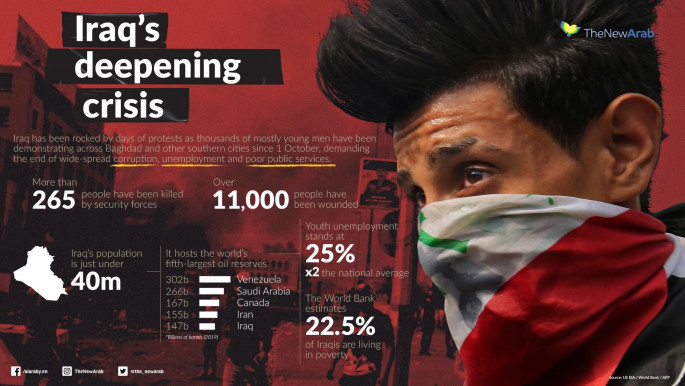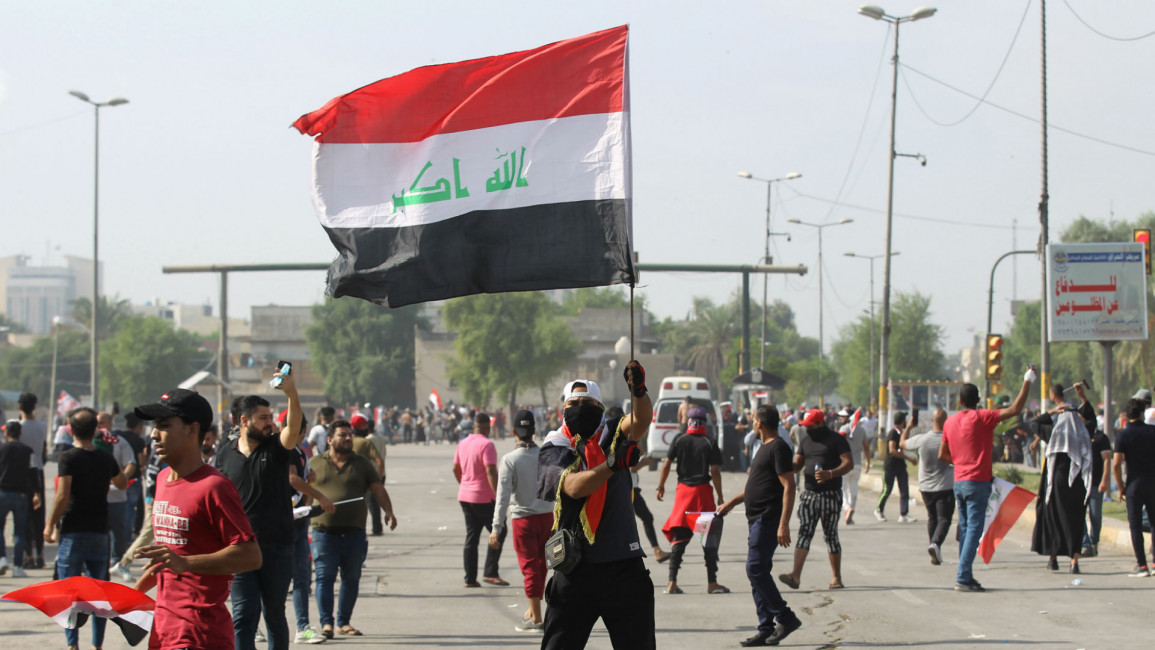Iraq factions 'reach deal' to protect Abdel Mahdi's government, end protests after weeks of violence
Iraq's political class has reached a consensus to protect Prime Minister Adel Abdel Mahdi's government against protests sweeping the country's capital and south for weeks, sources told AFP on Saturday.
The agreement is the product of a series of meetings, including gatherings led by Major General Qasem Soleimani, commander of the Iranian Revolutionary Guard Corps' foreign operations arm, the Qods Force.
He has met with top leaders in Najaf and Baghdad, piling on the pressure to close ranks around Abdel Mahdi.
A source present at some of those meetings told AFP Soleimani had met with populist cleric Moqtada Sadr and Mohammed Ridha Sistani, the son of Iraq's top Shia cleric, Grand Ayatollah Ali Sistani, all of which, have vocally backed the protests,
"Those meetings resulted in an agreement that Abdel Mahdi would remain in office," the source said.
Public anger erupted into demonstrations on October 1 against corruption and a lack of jobs, escalating into calls for the entire ruling system to be overturned.
Abdel Mahdi, 77, came to power last year, pledging to tackle both corruption and unemployment.
But he has become the target of protesters' rage, accused of commandeering a bloody crackdown that has left nearly 300 dead since protests broke out.
Another source said political factions agreed this week to move forward on reforms if the premier and government stayed in place.
"Most of the heads of major blocs agreed in a meeting to keep Adel Abdel Mahdi and maintain power in exchange for reforms on corruption and constitutional amendments," said the source, a high-ranking member of a party that was represented at the gathering.
"They agreed to end the protests with any means possible and to reopen the bridges and shuttered streets," the official said.
In a speech read out on his behalf on Friday in the Shia holy city of Najaf, Iraq's foremost Shia cleric, Grand Ayatollah Ali Sistani, praised protesters while holding Iraqi security forces responsible for their deaths.
He added that the Iraqi government must immediately meet protesters' demands.
Sistani said that "Iraqi political factions who hold power now have a unique opportunity to meet protesters' demands according to an agreed roadmap, within a specific period of time".
However, Sistani also said that there were "internal and foreign" factions trying to influence the protests.
The head of the Iraqi Group for Strategic Studies, Wathiq Al-Hashemi, told The New Arab that the influential Shia cleric's remarks could be interpreted as a second chance to Iraq's embattled Prime Minister, Adel Abdel Mahdi, who has been deserted by allies and faced calls to resign.
He said that Sistani wanted to give a message to Abdel Mahdi that he could stay in office for now as long as he made a serious attempt to carry out reforms.
Overnight, security forces began clearing out protest camps in Baghdad, the port city of Basra and the holy city of Karbala.
Retaking bridges
In Baghdad, Iraqi security forces wrested back control of three bridges that had been partially occupied by anti-government protesters in recent days, AFP correspondents said on Saturday.
They retook the Al-Sinek, Al-Shuhada and Al-Ahrar bridges over the River Tigris that link the east bank, where the main protest camps are located, with neighbourhoods on the west bank that are home to government offices and foreign embassies.
Amid volleys of tear gas, security forces chased demonstrators back onto Al-Rasheed Street, one of Baghdad's oldest and most celebrated thoroughfares.
Protesters still occupy part of Al-Jumhuriyah (Republic) Bridge, the southernmost of the capital's bridges and the closest to the main protest camp in Tahrir (Liberation) Square.
Over the past two weeks, demonstrators had spilt over from the square, first taking over part of Al-Jumhuriyah Bridge before creeping north onto the other three.
But the government ordered the security forces to keep them back, as Al-Jumhuriyah Bridge leads into the Green Zone where parliament and the British and US embassies are located.
Al-Sinek Bridge provides access to the embassy of Iran, a target for protesters who accuse Iraq's eastern neighbour of propping a government they regard as irredeemably corrupt.
Al-Ahrar (Free Men) and Al-Shuhada (Martyrs) bridges lead to the prime minister's office and state television headquarters.
Nearly 300 people have been killed in protest-related violence since demonstrations erupted on October 1 and swiftly spread from Baghdad to cities across the south, according to an AFP toll.
The government has stopped issuing updated tolls.
The protests have been described as the biggest challenge to the Iraqi government since the defeat of IS in Iraq in 2017.
Follow us on Twitter and Instagram to stay connected!



